Cat Peeing Problems: Why Is My Cat Peeing On My Bed?
Do not be angry with your beloved feline for urinating on your bed. Although you trained your cat with a litter box, there are some reasons why this type of occurrence happened.
So, why is my cat peeing on my bed? According to veterinarians cats peeing on beds could be a biological problem, and it’s often linked to anxiety, stress, medical problems, or litterbox issues. Cats might also mark their territory due to instinctual reasons, or it isn’t fixed (not spayed or neutered).
Stress and anxiety, such as changes in the household or routine, can lead to inappropriate urination. Medical problems like urinary tract infections, bladder issues, diabetes, or kidney disease might cause discomfort and result in urinating on the bed. Behavioral factors like inadequate litter box availability, location, or cleanliness could contribute.
Want to know more about cats:
Usual Cat Peeing Behavior
Cats have specific behaviors when it comes to urination, and understanding these can help you address any issues related to cat pee. Here are some usual cat peeing behaviors:
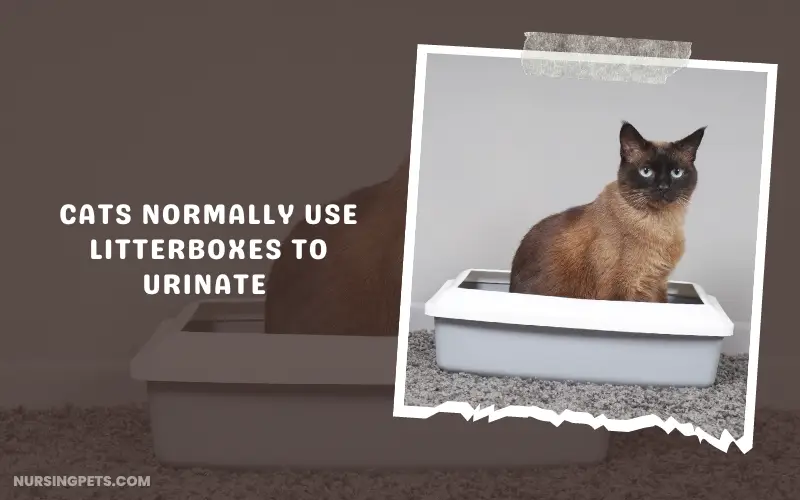
Litter Box Usage: Most cats are naturally inclined to use a litter box for urination. They will typically seek out a suitable spot to relieve themselves, and if a clean litter box is provided, they’ll use it consistently.
Scent Marking: Cats are territorial animals, and they might mark their territory by urinating in specific areas. This is more common in unneutered males but can occur in any cat. Neutering/spaying can help reduce this behavior.
Spraying: Spraying is different from regular urination. It involves a cat backing up to a vertical surface and releasing a small amount of urine. This is often a marking behavior related to territory or communicating with other cats.
Avoidance of Dirty Litter Box: Cats are known for being clean animals. If the litter box isn’t kept clean, they might avoid using it and find alternative urinating spots.
Territorial Disputes: In multi-cat households, cats might urinate outside the litter box to establish territory or challenge other cats’ dominance.
These are the common cat peeing behavior. Cats may also pee differently because of medical issues, old age, or different stressors.
13 Usual Reasons Why Your Cat Pees on Your Bed
Peeing on the bed is not a cat’s usual behavior. Illness or some other factors may trigger this. So, before you get angry and punish your cat, let’s find out all the possible reasons why do your cat pees on your bed.
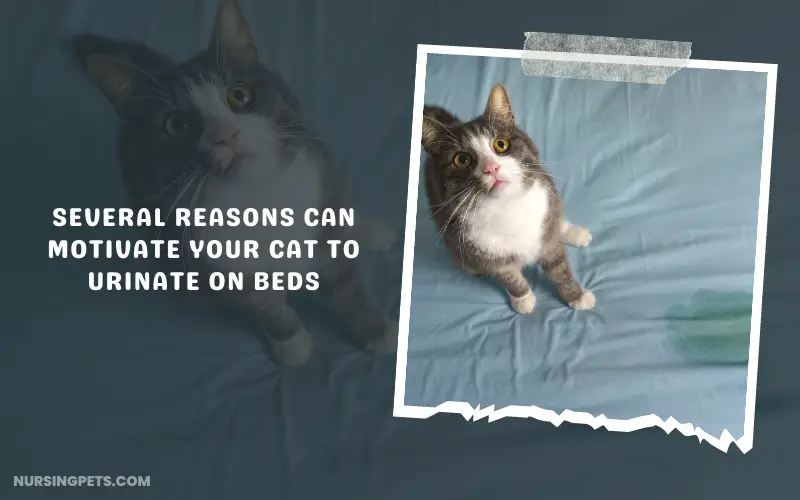
1. Medical reasons
We already mentioned cats peeing on the bed may indicate disease. Therefore, first, you need to identify whether it’s a health problem or not. So, how do you know your cat’s pee on the bed due to medical causes? We identify some medical issues that are responsible.
Urinary Tract Infection (UTI): Urinary tract infections can cause discomfort and a sense of urgency in cats, leading them to urinate in unusual places like the bed.
Bladder Stones or Crystals: Bladder stones or crystals can cause pain and irritation in the urinary tract, prompting a cat to urinate outside the litter box. The soft bedding seems like a more comfortable option for them.
Feline Lower Urinary Tract Disease (FLUTD): FLUTD encompasses various urinary tract disorders that can cause painful urination and an increased frequency of urination.
Diabetes: Diabetes can lead to increased thirst and urination in cats. When the urge strikes suddenly, a cat does not make it to the litter box in time, opting for a nearby soft surface.

Hyperthyroidism: Hyperthyroidism, characterized by an overactive thyroid gland, can lead to increased urination in cats. The discomfort of frequent urination discourages a cat from using the litter box.
Kidney Disease: Cats with kidney disease sometimes experience higher drinking and urination. The urge to urinate frequently results in accidents, including on the bed.
Incontinence: Incontinence, often seen in older cats or those with neurological issues, can lead to accidents outside the litter box. Cats do not have full control over their bladder, causing them to urinate on the bed.
Pain or Discomfort: Cats experiencing pain, such as from arthritis or other medical conditions, might find it difficult to use the litter box. The bed is more appealing for them, especially if they associate the litter box with discomfort.

Cognitive Dysfunction Syndrome (CDS): Senior cats can develop cognitive dysfunction, leading to confusion and changes in behavior, including urinating on the bed. This syndrome is akin to dementia in humans.
Urethral Obstruction: Urethral obstructions, although more common in male cats, can cause difficulties in urination. Cats associate the litter box with pain and avoid it.
The above-mentioned points are the possible medical issues for cats that can lead to urination on your bed.
2. Litter Box Problems
Another trouble that drives your cat into this messy peeing act is the litter box itself. Cat with litter box problems can go through some behavioral changes. Here are some issues associated with litter boxes.

- Litter Box Location: The placement of the litter box is crucial. Cats prefer quiet and easily accessible locations. Placing it in a busy or noisy area can deter them from using it.
- Insufficient Litter Boxes: In a multi-cat household, having inadequate litter boxes can lead to territorial disputes and avoidance of the boxes. The general rule is one box per cat, plus one extra.
- Inappropriate Litter Box Type: Cats might dislike certain litter box designs, such as covered boxes or those with high sides. They find it uncomfortable or feel trapped.
- Litter Preference: Interestingly, cats can be picky about the type of litter. Some prefer certain textures, scents, or materials. Experimenting with different litters can help identify the cat’s preference.
- Uncleaned Litter Boxes: You may know cats are comparatively clean animals and also dislike dirty litter boxes. Therefore, they avoid it. You need to scope their litter box once or twice a day. Sooner will be better.
3. Changes in the Household
Cats are sensitive to changes in their environment, such as moving, remodeling, or new furniture. These changes can disrupt their routines and lead to litter box problems and unwanted urination behavior.

4. Fear, Stress, or Anxiety
Cats associate the litter box with a negative experience if they feel threatened or stressed by something. Therefore, your cat starts to urinate on your bed and other unwanted places.
5. Marking Behavior
Unneutered cats or those in heat might engage in marking behavior by urinating outside the litter box to establish territory or attract mates. This is a common behavior among cats.
6. Previous Soiling Sites or Odor
If a cat has previously soiled an area outside the box, the smell might encourage them to continue using that spot. So, after your cat pees in unwanted spaces, you need to remove the urine ASAP.
7. Routine Changes
Cats thrive on routines. Alterations in feeding times, playtime, or interaction can lead to stress-related litter box problems. Through these changes, even a healthy cat can get sick multiple times a week.
8. Boredom
Cats need mental and physical stimulation. Boredom can manifest unwanted behaviors like this. Keep your environment full of activities so your cat doesn’t get bored.

9. Unneutered Cat
As mentioned, unneutered male cats have a higher likelihood of urine spraying. They may exhibit behavior such as territorial marking with urine, aggression toward other cats, and a strong instinct to mate. Neutering can help reduce this behavior.
10. Separation Anxiety
Cats can miss their owners and show distress by avoiding the litter box. Symptoms of separation anxiety can include excessive meowing, destructive behavior, excessive grooming, urinating or defecating outside the litter box, loss of appetite, and restlessness.
11. Introduction of a New Pet
A new pet’s presence can lead to territorial disputes or jealousy, causing litter box problems. Introduce a new pet gradually: exchange scents, allow visual contact, control meetings with rewards, and increase interaction time.
12. Lack of Training
If a cat wasn’t properly trained to use a litter box, they might not understand its purpose. Positive reinforcement can help establish the correct behavior.
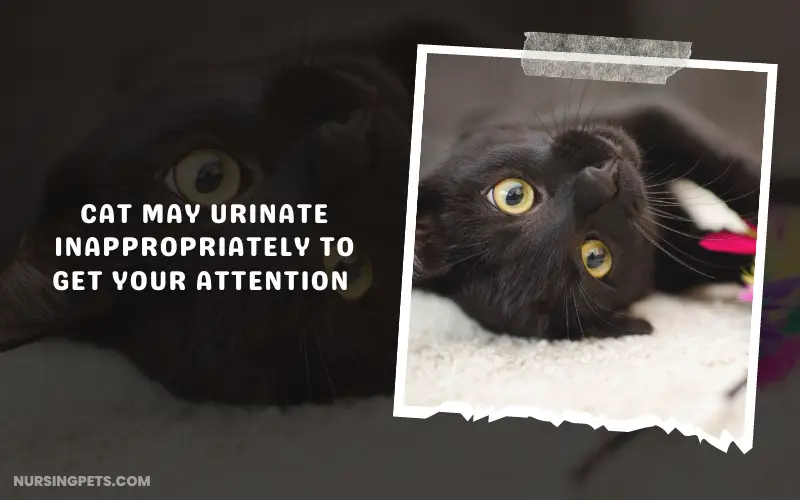
13. Attention-Seeking Behavior
Cats might act out, including using inappropriate places for elimination, to get their owner’s attention. They display attention-seeking behavior through meowing, rubbing, or jumping on laps. When a cat does these, play and spend more time with your cat or give them food.
How to Stop My Cat from Peeing on My Bed?
Peeing on the bed is pretty gross for the adorable, beloved, cute little furry friend. But don’t be bothered with it. This problem has solutions. Let’s discuss them- What can you do to stop a cat’s peeing on the bed:
Consult a Veterinarian
If your cat suddenly starts urinating outside the litterbox, the first step is to consult a veterinarian. Medical issues such as urinary tract infections or kidney problems could be the underlying cause of this behavior. Check your cat’s health before attempting behavioral interventions.
Litterbox Management
Good litterbox management can help your cats avoid urinating in unwanted places. There are tips you can follow to manage your cat litterbox perfectly. Such as:
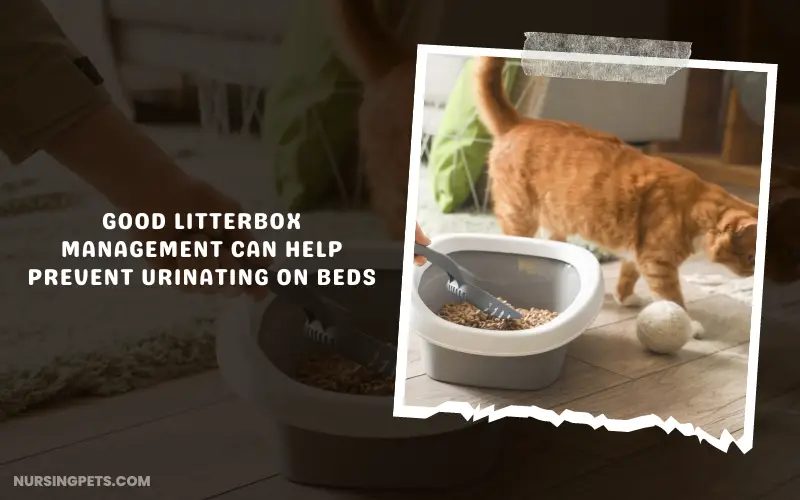
- Keep It Clean: Cats are meticulous about cleanliness. Ensure the litterbox is scooped daily and completely changed at least once a week.
- Increase the Litterboxes: Having multiple litterboxes in different locations can reduce the likelihood of accidents.
- Change the Location: Place litterboxes in quiet, easily accessible areas to make them more appealing to your cat.
- Try Different Litterbox and Litter: Experiment with various litterbox styles and types of litter to find what your cat prefers.
Provide a Safe and Stress-Free Environment
Cats may urinate inappropriately due to stress or anxiety. Create a calm environment by offering hiding spots, vertical spaces, and interactive toys.
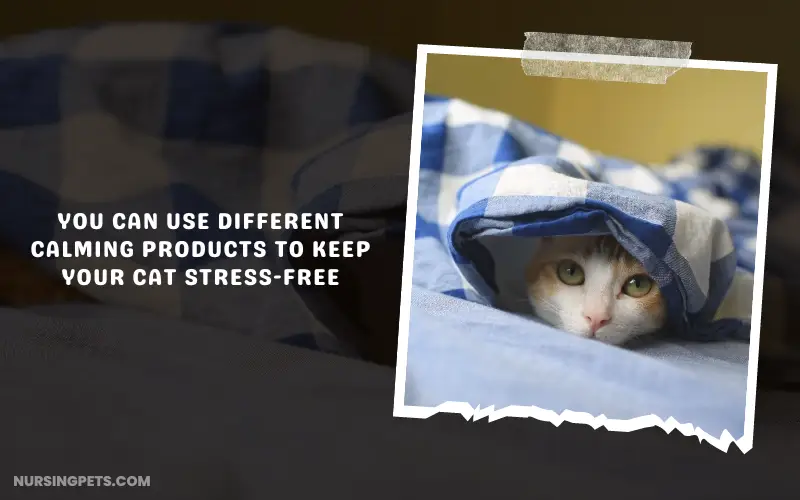
Feliway diffusers (the link will take you to Amazon) are considered one of the effective items in the market, which release calming pheromones and can also help cats reduce stress.
Train Your Cat Properly
Positive reinforcement techniques can be used to train your cat to use the litterbox consistently. Reward your cat with treats or praise when they use the litterbox correctly.
Keep the Cat Active and Stimulated
Boredom can contribute to behavioral issues. Engage your cat in regular play sessions and provide toys that encourage mental stimulation.
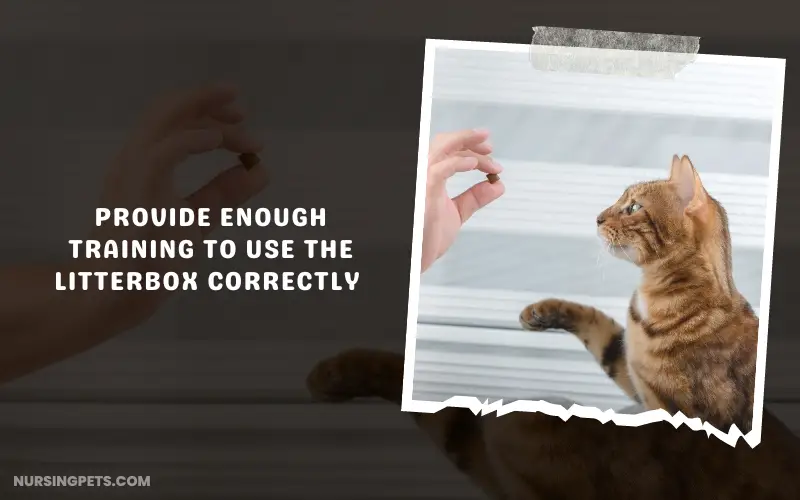
Behavioral Modification
If your cat continues to pee on the bed, consider consulting a professional animal behaviorist. They can assess the situation and provide tailored recommendations.
Clean the Area Properly
Thoroughly clean any areas your cat has soiled to remove lingering scents that might attract them back. Use enzyme-based cleaners designed to neutralize odors.
You can check this cat pee odor eliminator from Amazon, which can help you to do this job better.
Gradual Changes
Changing your cat’s behavior takes time. Be patient and consistent with your efforts, and avoid punishment, as it can worsen the issue.
Neuter the Cat If Necessary
Neutering can often reduce territorial marking behaviors. If your cat isn’t spayed or neutered, consider discussing this option with your vet. In case your cat pees on the bed after nurturing, then there could be a medical or other issue.

Make the Place Unattractive
Place aluminum foil, double-sided tape, or a plastic carpet runner with the nubs facing up on the bed. Cats dislike these textures and may avoid jumping on the bed, hence the accident.
Try Calming Products
Calming collars, sprays, or diffusers can help reduce anxiety-related behaviors. Read the user manual and follow the instructions before using any new products.
If you’re looking, you can try this cat’s calming pheromone from Amazon. This may help you.
Bed Protection
Use waterproof mattress covers or protective layers on the bed to prevent urine from seeping into the mattress.
Spend More Time with the Cat
Offering attention and affection can help strengthen the bond between you and your cat, potentially reducing stress-related behaviors.

Limit Access to the Bed
Close the bedroom door or use baby gates to restrict your cat’s access to the bed area, especially when you’re not around to supervise.
Cat Diapers
As a last resort, cat diapers can be used to prevent accidents while you work on resolving the issue.
Are There Any Home Remedies to Prevent Cats from Peeing On Beds?
Indeed, there are some home remedies. You can use these resources to prevent your cat from peeing on the bed. Use citrus scents like lemon, oranges, and limes – cats universally dislike these items. Embrace these natural repellents to safeguard your furniture from feline mishaps.

Be careful before using natural remedies. Some natural items could be harmful to your cat if those direct contact with your cat’s skin.
We wrote an article focusing on this topic. You can check this out: Smells that deter cats from peeing.
Are There Specific Products That Can Help Deter Cats From Peeing On Beds?
Yes, several products are available that can help deter cats from peeing on beds or other unwanted areas. Here are some options to consider:
Cat Repellent Sprays:
There are commercially available cat repellent sprays (From Amazon) that emit scents that cats dislike, such as citrus or lavender. These sprays can be applied to areas you want to protect, like your bed. Make sure to choose a cat-safe spray.
Double-Sided Tape:
Cats often dislike the sticky feeling of double-sided tape (From Amazon) on surfaces. Applying this tape to your bed can discourage them from jumping on it.
Plastic or Aluminum Foil:
As mentioned, cats also tend to dislike the texture and sound of plastic or aluminum foil. Placing these materials on the bed can make it less appealing for them.
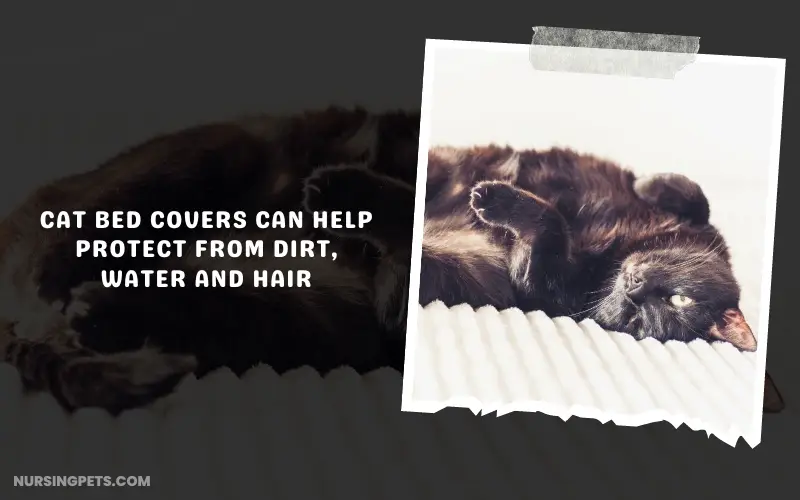
Cat-Friendly Bed Covers:
Some companies produce bed covers (From Amazon) that are designed to protect your cats. These covers often protect from dirt, water, hair, and any other mess. And this bed cover is also safe from scratching or peeing over it.
Automatic Deterrent Devices:
There are motion-activated devices available that emit a sudden noise, spray of air, or mild static shock when a cat approaches the protected area. These devices can startle the cat and discourage them from coming near the bed.
Provide Alternative Resources:
Make sure your cat has access to a clean litter box that is placed in a quiet, easily accessible location. As covered, inappropriate urination often occurs due to issues with the litter box.
Use Feliway Diffusers:
Feliway (the link will take you to Amazon) is a synthetic feline facial pheromone that can help reduce stress in cats. Diffusers that release this pheromone can create a more calming environment, which helps deter inappropriate urination.
How to Punish Cat for Peeing On Bed? Should You Punish?
Sometimes, your cat just keeps peeing on your bed. You must be angry when this repeatedly happens right in front of you. But punishing your cat out of rage can worsen the problem and damage your relationship with furry friends.
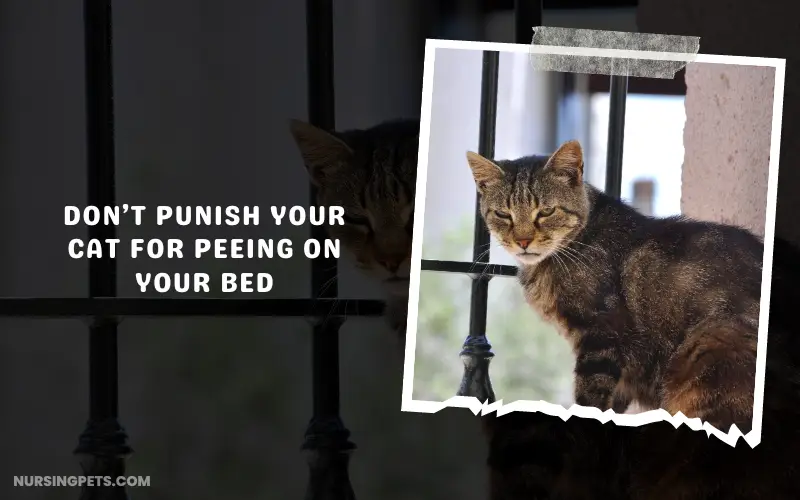
Cats do not understand punishment in the same way we do. Therefore, you shouldn’t punish your cat for inappropriate urination. Be patient and try to understand your cat.
Unwanted urination is a common problem in cats. With the right approach, you can work toward resolving the issue without causing stress or harm to your feline friend.
Frequently Ask Questions
1. Why Is My Cat Peeing on My Bed All of a Sudden?
Sudden changes in a cat’s urination habits can signal stress, medical issues, or changes in the environment. Consider factors like a litter box, routine, or recent changes that might be causing stress.
2. Why Is My Male Cat Peeing on My Bed?
Male cats may pee on beds due to territorial behavior, urinary tract issues, and stress. Provide a calm environment to reduce stress and try litter box strategies. You can also consider neutering if not done yet.
3. Why Is My Female Cat Peeing on My Bed?
Female cats pee on the bed are almost the same reasons as males, such as health issues like UTIs, behavioral problems like fear, distress or trauma, or litter box dissatisfaction.
Closing Words
Finally, we want to say that a cat peeing on your bed can be distressing. So, approach it with empathy. Be aware of potential health problems and maintain a consistent routine.
Also, don’t forget to provide ample litter box care. And then you might help mitigate this behavior. In case the issue persists, consulting a veterinarian is inevitable.
References:
- https://www.aspca.org/pet-care/cat-care/common-cat-behavior-issues/litter-box-problems
- https://resources.bestfriends.org/article/cat-not-using-litter-box-causes-and-solutions
- https://www.humanesociety.org/resources/how-help-your-cats-use-litter-box
- https://www.petmd.com/cat/general-health/top-10-ways-stop-your-cat-peeing-outside-litter-box

